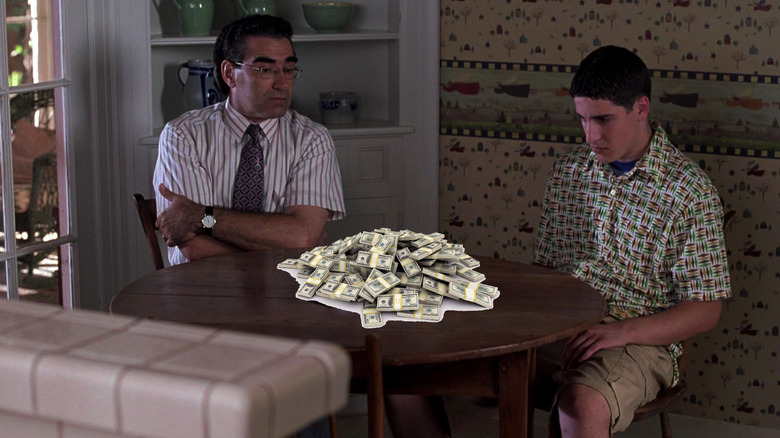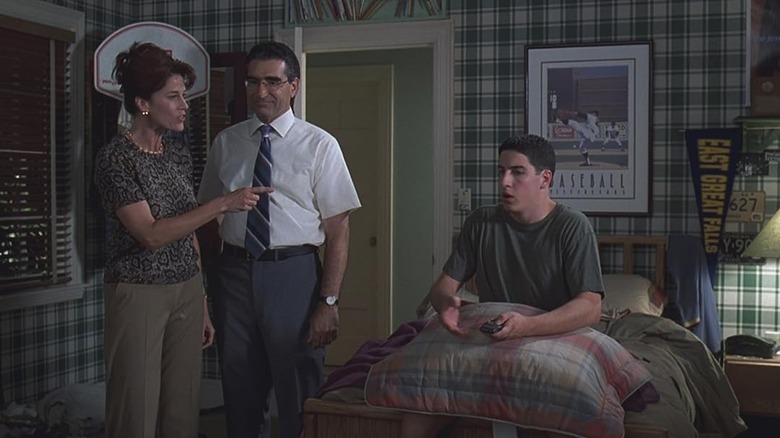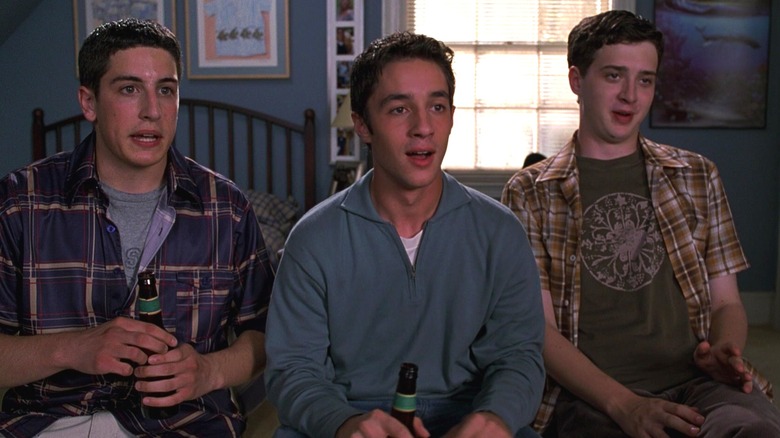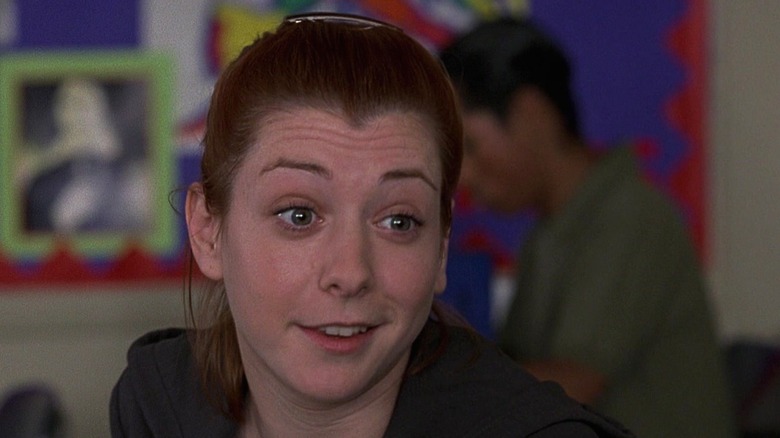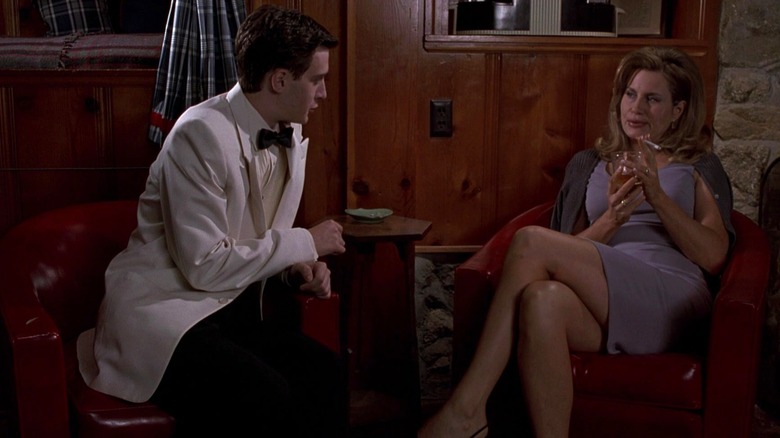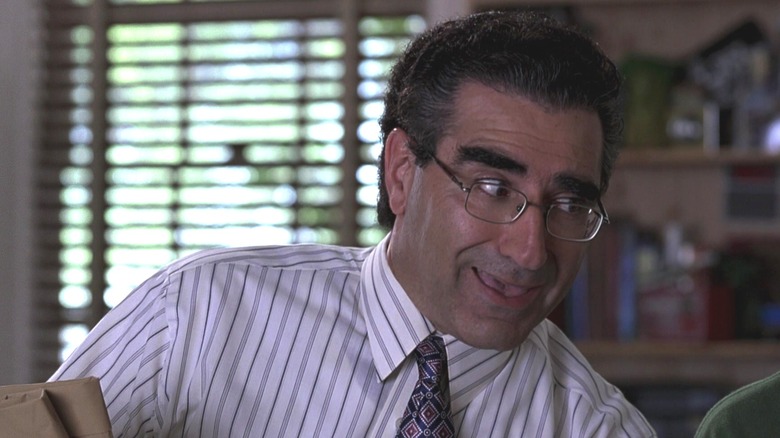25 Years Ago, American Pie Launched An Unlikely $1 Billion Franchise
(Welcome to Tales from the Box Office, our column that examines box office miracles, disasters, and everything in between, as well as what we can learn from them.)
"'American Pie' is the latest in a long tradition of immature, self-indulgent comedies that celebrate the recklessness of adolescents." That's what Looking Closer's Jeffrey Overstreet had to say in his original review of "American Pie" in 1999. On the flipside, Film Threat's Chris Gore declared the movie to be "one of the greatest teen films of all time." Let us never forget that two things can be true at once.
Written by an unknown named Adam Herz, it originally began circulating with the clever title "Untitled Teenage Sex Comedy Which Can Be Made for Under $10 Million That Studio Readers Will Most Likely Hate But I Think You Will Love." The gimmick worked and it got the attention of studios, becoming the subject of a bidding war that Universal won. Without exaggeration, it might have been some of the best money the studio ever spent, as the ensuing film not only created a hit that reignited the teen sex comedy genre, but it created a surprisingly enduring $1 billion franchise with nine movies to date. Not bad for a movie where a kid f***s a pie.
In this week's Tales from the Box Office, we're looking back at "American Pie" in honor of its 25th anniversary. We'll go over the wild way the movie got made in the first place, the many title changes it went through, the issues in putting the now-classic cast together, what happened when the movie hit theaters, what happened in the years following its release, and what lessons we can learn from it in the modern context. Let's dig in, shall we?
The movie: American Pie
Universal paid $750,000 for the script written by Herz, a first-time feature writer. The studio then brought on "Antz" screenwriters Chris and Paul Weitz to direct the comedy, which would go through several titled changes before its release, including "East Great Falls High" and "East Grand Rapids."
Herz was working in Hollywood as a production assistant when a friend of his gave producer Warren Zide two of his spec scripts for "The Larry Sanders Show." That helped generate interest in signing him, not to write TV, but to write movies, which is something he had not considered doing. "The only idea I had for a movie was about the s*** real high school kids do," Herz explained in a June 1999 interview with Movieline. "When I asked Warren, 'Where did those great party movies go?' he said, 'Great idea! Let me show you Porky's, it's right here on my shelf.' They just go for it."
At the time, teen sex comedies were all but dead, but the once-popular genre had spawned huge hits such as "Porky's" and "Animal House." So, Herz got to work and a scenario that most aspiring filmmakers can only dream of fell into his lap. As the writer explained in that same interview:
"It's like living out that question everybody asks themselves. What would I do if I won the lottery? I mean, I graduated in 1996 from the University of Michigan as a film studies and communications major. I never even considered writing for movies. But I started writing the script on December 6 of last year and it was sold on January 23."
The film as we know it was inspired largely by Herz's own experiences and centers on four teenage boys who enter into a pact to lose their virginity by prom night, taking any measure necessary to get it done.
American Pie assembles a new generation of stars
Universal assembled a cast composed mostly of up-and-comers including Jason Biggs (Jim), Alyson Hannigan (Michelle), Seann William Scott (Stifler), Tara Reid (Vicky), Chris Klein,(Oz), Natasha Lyonne (Jessica), Thomas Ian Nicholas (Kevin), and Eddie Kaye Thomas (Finch).
Comedy icon Eugene Levy ("SCTV") was the big exception, playing Jim's affable dad. Other actors such as Bill Murray were considered, but Levy landed the role. However, he did have concerns about the portrayal of the character. In a 2015 HuffPost interview, the actor explained that he crafted his version of Jim's dad though improv.
"All the scenes in 'American Pie' came out of an improvisation. I wanted the character to be a real dad. Like a real, corny dad who cares about their children. I wanted to be the kind of parent that the kids didn't want to hang with ... [the original version] was a little creepy. So I made him more square."
At the time, there was not much suggesting the film was going to be a huge hit, but those involved had some sense what they were doing was working. "Personally, I felt like we were part of something special," Biggs recalled in a 2019 retrospective interview, though the actor did express reservations about the now-infamous pie f*****g scene:
"The day of filming this scene, I had a complete freakout. I called my manager in my trailer and I was like, 'Am I really gonna do this? What if no one sees this? What if absolutely no one sees this and then I f*** a pie for no other reason than just I got paid very little money.'"
Speaking of the pay, Scott revealed on "The Rich Eisen Show" in 2023 that he was paid just $8,000 for his role in the film. It was so little money that, before it came out, the actor was still working as a churro guy at the Los Angeles Zoo to help pay the bills.
The financial journey
Herz's original title proved close to true, as "American Pie" was made for a reported budget of $11 million. They did have a little hurdle to clear as the comedy originally received an NC-17 rating, but after editing down the pie scene a bit, the directors got it down to an R. The marketing leaned into that R rating, putting all of the raunchy sex and crass humor on full display. The generation of moviegoers this was aimed at hadn't ever seen anything like this, so it felt fresh — sort of like a warm apple pie, if you will. The gimmick worked like gangbusters.
"American Pie" opened on July 9, 1999, right in the heart of the summer season. Luckily, there was very little by way of competition, save for Will Smith's box office bomb "Wild Wild West," which was in its second weekend. The comedy topped the charts with a downright surprising $18.7 million. Mind you, this was by '99 standards and that number is unadjusted for inflation. That would be roughly $35 million in today's dollars. It's been quite some time since an R-rated, original comedy opened that high. By my calculations, the last move to accomplish that was "Ted" ($54.4 million) in 2012.
The point is, the movie was an instant runaway success. It dropped less than 28% to bring in $13.5 million on its second weekend, even against director Stanley Kubrick's final movie "Eyes Wide Shut" and "Lake Placid." All told, it grossed $102.5 million domestically to go with $132.9 million overseas for a grand total of $235.4 million. That's roughly 20 times its production budget. The term "smash hit" gets thrown around a bit too often, but this was truly a smash hit.
A new comedy franchise is born
Even beyond the raw ticket sales, the film's cultural penetration was palpable. They may not have invented the term "MILF," but the use of it in relation to Stifler's mom certainly popularized it. The impact was unquestionable. Naturally, Universal set about making "American Pie 2" as quickly as possible, with the follow-up hitting theaters in 2001 and making $287.5 million against a $30 million budget. "American Wedding" followed two years later in 2003, pulling in $232.7 million against a $55 million budget.
Diminished though the returns were becoming, the audience was there. So Universal set about making a series of direct-to-video spin-offs of the films with new cast members, beginning with 2005's "American Pie Presents: Band Camp." Levy often popped up to help anchor the continuity as these films continued to roll out, right up through "The Book of Love" in 2009. The studio also revived the series with "American Pie Presents: Girls' Rules" in 2020, offering a bit of a gender-flipped perspective on the films.
The original cast returned nearly a decade later for 2012's "American Reunion." The magic was still there, as the film earned $236.7 million on a $50 million budget. All told, the theatrically released entries have pulled in more than $990 million globally. When coupled with the direct-to-video money and other revenue over the years, "American Pie" has comfortably become a $1 billion franchise.
Comedies have been tough to crack in the years since, with only a select few including "Ted," "The Hangover," and "Neighbors" resulting in true, R-rated theatrical comedy franchises not based on existing IP. In the pandemic era, theatrical comedy has been particularly challenging, with only rom-coms like "Anyone But You" and "The Lost City" able to cut through the noise. In that way, what this movie was able to accomplish seems all the more impressive.
The lessons contained within
Sure, it would be easy to write off "American Pie" as an immature, self-indulgent teen sex comedy. But it resonated with audiences in its day and these characters continued to resonate for well over a decade after the original hit theaters. The franchise name also still carried weight, as Universal is currently working on a reboot from filmmaker Sujata Day. So sure, call it immature if you like, but the web of influence is undeniable.
Does Natasha Lyonne break out to eventually give us stuff like "Russian Doll" and "Poker Face" without this movie? Maybe not. Careers were launched because of this movie. Comedies like "Road Trip" were made in an attempt to emulate this success. That's beyond impressive for a movie that was written in mere weeks by a first-time screenwriter. It feels a little fair to put some respect on this movie's name, even if many elements of it are outdated and questionable by modern standards. (No, broadcasting a girl via webcam from your bedroom for all to see is not okay. It's by no means an aspirational moral compass.)
Modern Hollywood can stand to learn a thing or two from "American Pie," outdated though it may seem. For one, just because a genre is dead doesn't mean it has to stay dead. The sex comedy was virtually extinct, but one executive had the guts to try to bring it back. Most important of all, the instinct wasn't to reboot something that already existed. It was to make something new.
A new thing can feel familiar but still be new. Franchises are a useful tool, but studios can't keep wringing blood from the same stones forever. In short, they should be on the lookout for the next idea as big as a horny teenager f***ing a pie. It could be worth $1 billion.
